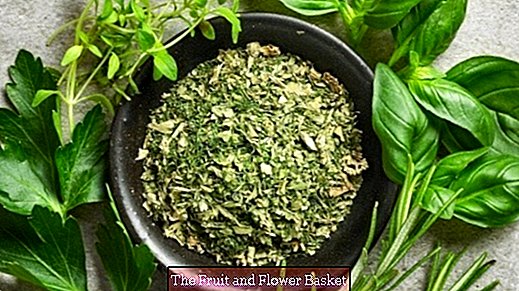Preserve and preserve herbs
Experience summery herb pleasure in the middle of the deepest winter? Who does not long for it? If you have your own herbs in the garden or would like to create a supply of sun flavor, you have the choice of different methods.
Harvest & prepare herbs
Whether you want to save the herb remnants from the frost in autumn or make use of the abundance in summer, is harvested in the morning? best if the herb is nice and dry. It should not have rained and the rope, if any, should have dried up. Basil, mint and sage are harvested before flowering, while oregano and lavender are the most aromatic during flowering. A tip: wash? The herbs in the bed? Rinse off with a hose the day before harvesting, then no valuable flavorings will be lost when washing after harvest. Before preserving, the herbs should definitely be completely dry.
Served ice cold: freezing
Not all herbs are suitable for simple freezing. Parsley, chives, chervil, dill, borage, sage and lemon balm already. To do this, chop the clean, dry herbs and, preferably, freeze them in portions: pour loosely into the ice cube container and pour over a little water. Freeze and then you can keep the cubes in freezer bags.
Mint and coriander greens are best frozen separately in whole twigs on a baking sheet and put them frozen into a bag.
An alternative for more sensitive herbs is the freezing in butter: chopped cress, tarragon and basil chopped with the triple amount of butter and also freeze in portions.
For Mediterranean herbs (rosemary, thyme or oregano) that goes well with olive oil.
Since coriander green becomes soggy when thawed, you can make a coriander oil paste: Add 60 ml of olive oil per 100g of coriander to the kitchen machine and freeze this paste in portions.
Do not thaw herbs from the freezer before use, then less flavor is lost.
Also good for teas: drying
Thyme, rosemary, bay leaf, oregano, savory, lemon balm, peppermint can also be dried well. To do this, harvest long stems, clean them (see above) and tie them together. Then hang upside down in a warm, dark place, for example a boiler room. After about two weeks you can store the rustling bundles in closed and opaque vessels, if possible in whole or in large pieces. Please always shred just before use, what has once dried is gone!
Fat or acid? insert
Vinegar and oil are excellent for preserving flavor. A herbal vinegar ripens best in a cool dark place, while you can put the herbal oil for a while in the sun. Best kept in the fridge.
Herbs with oil are good for making pastes that refine food. Just increase the proportion of herbs and make sure that the surface of the herbal paste is always covered with an oil layer.
Another type? Oil paste? is also a pesto. Not only basil is suitable for this, also with parsley, coriander or wild garlic a wonderful culinary delight results.
The basic recipe for basil pesto:
Mortar the basil with roasted pine nuts, garlic, sea salt and grated Parmesan, fill with olive oil until a creamy paste is formed (also faster: put everything together in the blender or blender). For wild garlic you can vary with pecorino. With parsley you take almonds. With coriander you work with roasted peanuts, chili, ginger and add some parsley.
Last, but not least: herbal salt
7: 1 or 1: 7? the mixing ratio of very finely chopped herbs to salt. If the proportion of herbs is greater, you must keep the mixture in glasses cool. Buy now  TZS First Austria dehydrator with temperature control from 35-70 ° Celcius, 5 height adjustable shelves, 42,99 ?
TZS First Austria dehydrator with temperature control from 35-70 ° Celcius, 5 height adjustable shelves, 42,99 ?





